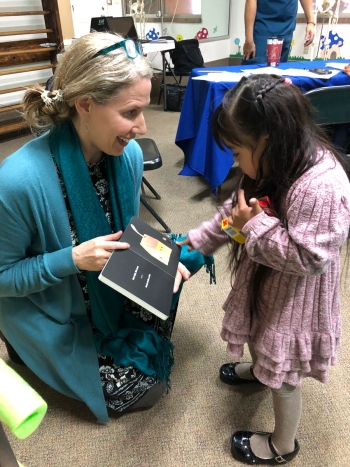Health Solutions faculty takes on role of president of Arizona Speech-Language-Hearing Association
Victoria Clark, clinical associate professor at the College of Health Solutions has been named as the new president of the Arizona Speech-Language-Hearing Association (ArSHA).
“When I was elected president, wonderful mentors in the organization advised me that the work of the presidency is to ‘steer the ship,’” said Clark. “... I am humbled by the expertise and energy Arizona brings to our field at the state, national and international level, even as we cope with a shortage of licensed speech-language-hearing professionals.”
ArSHA is an organization of speech and language pathologists (SLPs) throughout the state who serve patients, families and fellow professionals through mentorship, networking, community building, legislative advocacy and leadership. The organization's mission is ‘striving for a state where everyone communicates to their full potential.”
Originally working alongside and mentoring Arizona State University students in public schools and in-home early intervention for clinical rotations, seven years later Clark made the move to become a faculty member at the College of Health Solutions.
From an early age mentorship and finding purpose was instilled in her by her parents. Now, this same work and teaching philosophy is what drew Clark to join the Health Solutions faculty along with having worked with ASU students for years before.
“My parents showed me that finding meaning and purpose in how we spend our days is essential to a happy life;” said Clark. “I also appreciate that ASU and the College of Health Solutions recognize that the skills and tools that got us to where we are now are not necessarily the skills and tools we will need tomorrow and help us access so many training and mentoring opportunities here.”
Question: What was your “aha” moment when you realized you wanted to study Speech & Hearing Science?
Answer: I first discovered a love for learning new languages on a gap year as an undergraduate and was delighted to discover applied linguistics. I love working directly with people and children, so Speech-Language Pathology is the perfect combination for me: SLPs work with all age groups and with anyone who needs communication support, including the obvious speech sound disorders, but also people who struggle to learn and retain new vocabulary, speak in longer phrases with complex syntax, use culturally expected pragmatics and a range of other difficulties. It’s an incredibly rewarding field.
Q: What more do you want to accomplish here?
A: I have always practiced as a Bilingual SLP, and because I still collaborate with SLPs in the field, I see the urgent need for bilingual knowledge among all clinicians in Arizona, where about 25% of the population speaks more than one language. I would love to increase the number of students trained to correctly diagnose and serve the communication needs of bilingual populations, as well as bilingual graduates of our programs. I have been able to provide bilingual experiences to my clinical students for the five years I have been in Health Solutions, and I am always looking for new opportunities. We serve bilingual children here in Arizona and we have also formed excellent collaborative projects with Spanish-speaking professionals in Mexico. A Fulbright Specialist fellowship in Kosovo (2022) helped me see how international collaborations and cross-cultural professional development can be useful and motivating to students and faculty, especially where there is an ongoing collaboration before and after the in-person project.
Q. What is your most prized career accomplishment today? Why?
A: I am so pleased to have been supported by the college and ASU to create clinical opportunities in Spanish to train our students… One of my priorities is to recruit and train as many bilingual students as possible. So often, bilingual students enter the program unsure if they have the necessary professional language skills in Spanish. Offering clinical experiences in Spanish is vital to helping them make the decision about whether to practice as a bilingual SLP. I feel fortunate that the College of Health Solutions and ASU support our creating and innovating clinical services to reflect real practice in the field, including international experiences in Mexico and Kosovo.
All SLPs will encounter bilingual clients during their career and benefit from an understanding of how to effectively work with, diagnose, treat and refer bilingual people, as well as work through interpreters. I teach a course, SHS 597 for all students, bilingual and monolingual, to diagnose and treat bilingual patients effectively.
Q. What are some of your hobbies and interests outside of work?
A: I love international travel and getting out in nature, especially in a forest where I can take nice long walks with family and friends. Here in Arizona, we have easy access to the arts and you can often find me attending a comedy, theater or dance performance or enjoying galleries, especially at Tempe Center for the Arts.
Q. What does your perfect weekend look like?
A: In a perfect weekend, I would try a new restaurant with family and friends, hike along the Salt River and see the wild horses and stay in touch with family living on the East Coast.
Q. What is a talent or skill you have that someone wouldn’t necessarily know about you?
A: I’ve studied a number of languages over the years and although I focus on Spanish these days, I can still read Cyrillic and Hebrew alphabets. I also sing in a few gigs a year with our little family trio, Side by Side.
